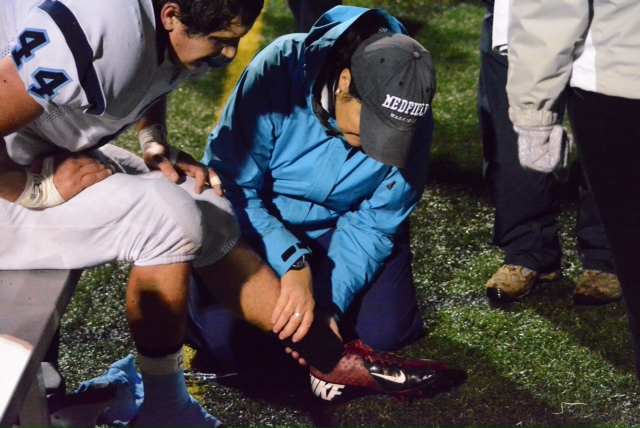Oct 21, 2016Coach Conflict

At one point or another, all athletic trainers must deal with coaches. Throughout my career — first as an athletic trainer at the NCAA Division I level and now as Head Athletic Trainer at Medfield (Mass.) High School — I have had a few encounters with coaches who were difficult. If you encounter a coach who is challenging to deal with and/or undercuts your authority as a health care professional, there are many approaches you can take.
First, meet with the coach in private and ask them what they need from you. Discuss your role and how you are there to support them and the team. If you are new to the coach or the team, you might need to establish trust first. Let the coach understand that you will communicate with them in the beginning and get their input on each injured player until you have an established trust.
If you’ve worked with the coach for awhile, be understanding but firm. Coaching can be a very stressful job, as all coaches face the pressure of winning for pay scale and job safety. You have to reassure them that you are not there to disrupt the team, but rather, to support it. Also let them know you understand that sometimes athletes try to get out of a hard practice or don’t handle injury well.
However, reinforce that the athlete’s health is always foremost in your approach. You must be the athlete’s advocate, since it is hard for them to stand up to a coach when the coach controls their scholarship money.
If this approach doesn’t work and the coach continues to be difficult, you have to begin to document everything. I might inform the coach with a daily injury report and discuss any issues I have with the team physician and athletic director. Rule number one is cover your tracks. Make sure your records for each injury are written and kept on file.
Reinforce that the athlete’s health is always foremost in your approach. You must be the athlete’s advocate, since it is hard for them to stand up to a coach when the coach controls their scholarship money.
Sometimes, you might have to get your administration or parents involved. It is important that the administration back you up. They must describe a chain of command designed to assure medical and return-to-play decisions are made by medical personnel — without pressure from coaches or fear of losing jobs.
If you think an athlete is at risk, confront the coach and inform them that you will be contacting the parents, who can also apply pressure. The athletic trainer should contact parents whenever an athlete sustains a significant injury, anyway. You want to be sure they are informed and kept up to date on the health of their child. This is especially important at the high school level.
Fortunately, some tides are changing for athletic trainers dealing with difficult coaches. At the D-I level, there have been many instances in the past of a coach removing an athletic trainer from their sport or from the school altogether. This was dangerous for schools and could have opened them up to lawsuits. Nowadays, many schools are going to a medical model. Under this framework, athletic trainers’ jobs come through the medical center and not athletics. As such, they report to a head physician, not the athletic director. This has been very successful in elevating the status of athletic trainers and increasing salaries and budgets. They are being treated like the health care professionals they are.
In conclusion, remember that communication is key and that medical records are extremely important in our profession. You are the health care professional, and you need to stand firm when challenged, no matter your age or experience. Inform your administration of the difficult coach if he or she persists, and confer with other colleagues in the profession who have had similar issues with their coaches.



